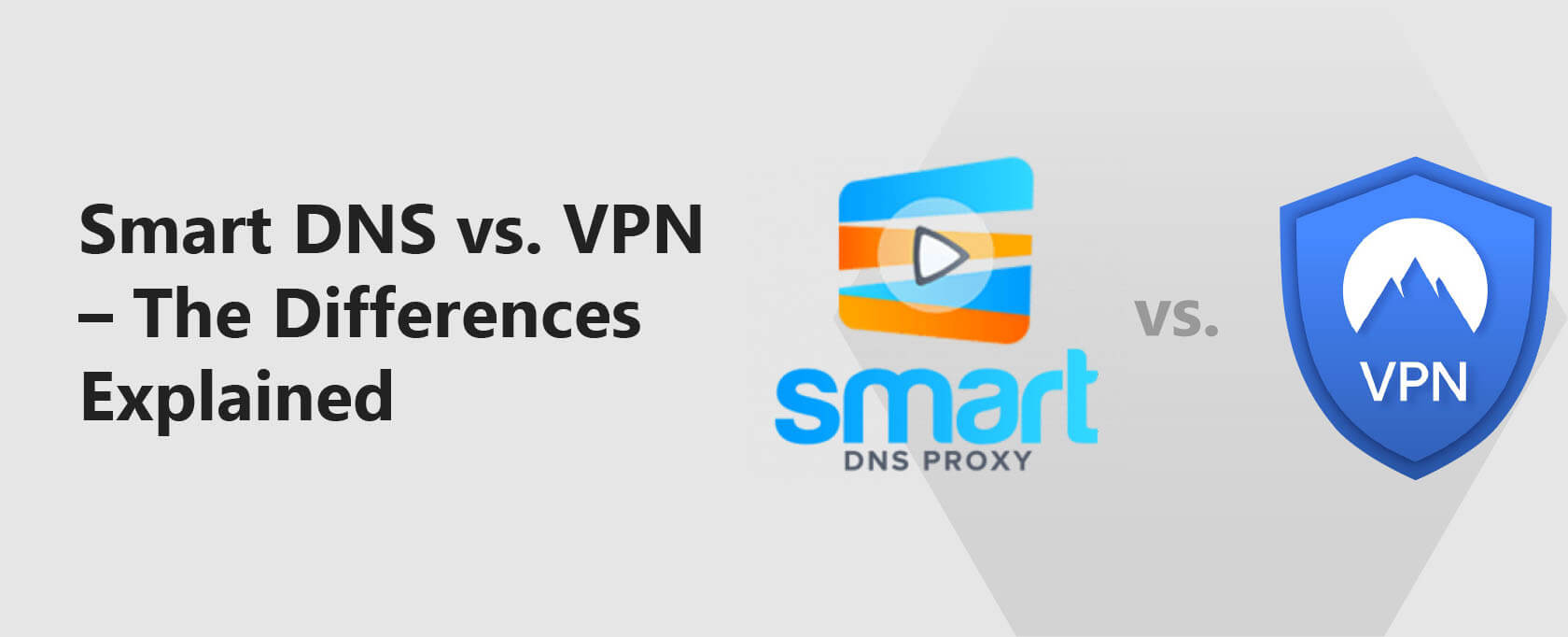Smart DNS vs. VPN – The Differences Explained
A Smart DNS or VPN are the top tools that you can use to bypass geo-restrictions and gain access to online content. Mostly, streaming blocked content from various online video services.
Both Smart DNS and VPN spoof your geo-location, but they do it differently. Furthermore, a VPN is more security and privacy-oriented than a Smart DNS.
- What is a Smart DNS, VPN, and how do they work?
- How to choose the best Smart DNS or VPN.
- The differences and similarities between a Smart DNS and a VPN.
- Use cases for VPNs and Proxy servers.
Read on to find out more about Smart DNS and VPN!
Smart DNS works by rerouting your location-specific queries through a proxy server, effectively spoofing your geo-location without encrypting your data.
VPN offers encryption for your internet traffic and diverts it through a VPN server, providing enhanced security and privacy.
Continue reading to explore the distinctions and similarities between Smart DNS and VPN, and to understand how to choose the best option for your needs.
What is a Smart DNS, and How Does it Work?
A Smart DNS proxy combines a DNS and proxy server technology. When you use a Smart DNS, your internet queries will be serviced by the selected DNS server.
The DNS server then routes your queries via a proxy server. Then the proxy server accesses the site you want and relays the results.
The site will pick up the proxy server’s location and not yours. Thus, a Smart DNS proxy spoofs your geo-location, and the site will think that you are on the required geo-location.
However, in this combination, your IP address is not changed. The proxy relays your queries from its location.
Also, your data is not encrypted, although some Smart DNS providers may encrypt your DNS queries.
What is a VPN, and How Does it Work?
A VPN encrypts your internet traffic and creates a secure connection over the internet. The encryption ensures that no authorized entities will gain access to your traffic.
Besides encryption, a VPN routes your traffic through a VPN server. The server masks your actual IP address with its VPN IP address.
If you access a site from a US server and are in Germany, the site will think you are in the US. This is how a VPN bypasses geo-restrictions and censorship.
Concisely, a VPN increases your online privacy and security.
How to Choose a Smart DNS or VPN?
It would help if you used a reputable Smart DNS proxy or VPN to bypass geo-restrictions. Unfortunately, not all Smart DNS or VPNs are built the same. Consider the following factors when choosing a reputable Smart DNS or VPN.
Most Smart DNS won’t be able to unblock blocked websites and streaming services such as BBC iPlayer, Netflix, and Hulu.
Check out our guides on how to watch BBC iPlayer in the USA and how to unblock Netflix for more info on the above.
You can also unblock websites much more efficiently with a VPN service.
For a reliable and effective solution to unblock websites and streaming services like Netflix, it’s crucial to choose the best Netflix VPN that suits your needs.
Servers: you should choose providers with many servers that span a wide geographical area. This will ensure that you unblock and gain access to worldwide content. Additionally, many servers provide that you will avoid congestion.
Speed and unlimited bandwidth: In VPNs, the servers should be optimized for speed and offer unlimited bandwidth. Smart DNS is uniquely fast than VPNs. Nevertheless, they should also have optimized servers.
Compatibility: Smart DNS, by default, are compatible with most internet-capable devices. The VPN provider should offer apps for almost every computing platform. The VPN should also support simultaneous connections.
Security and privacy: the VPN provider should offer military-grade security and have a no-log policy. The VPN should also have features such as VPN kill switch, leak protection, and even split tunneling. Since Smart DNS doesn’t offer security, ensure they don’t keep logs if possible.
Money-back guarantee or free trial: this is a fail-safe if the services don’t work as advertised. Also, you will get to try the services before committing to a payment plan.
Great customer service: customer support is essential in case you get stuck while using the service. Look for providers with friendly, responsive, or 24/7 customer support.
Check out our guide on picking the best VPNs for more tips.
Differences and Similarities Between a Smart DNS and a VPN
A summary between Smart DNS and VPN:
| Smart DNS | VPN | |
| Online protection | None or minimal. | Excellent protection via encryption. |
| Speed | Very fast. | Fast. |
| Setup | Easy setup, no installations. | Requires installations. |
| Accessibility | Works with most streaming services. | Works with most streaming services. | Price | It can be cheap. | Reputable VPNs are pricey. |
Online protection: A Smart DNS doesn’t protect your online activities. On the other hand, a VPN uses encryptions and ensures a secure connection over the internet. A VPN takes care of your online privacy and security.
Speed: unlike a VPN, a Smart DNS doesn’t have encryption overheads. You will get somewhat similar speeds to those offered by your ISP. A VPN connection is slow due to the encryption overheads, and faraway servers may not have great speeds.
Setup: A Smart DNS doesn’t require installations. To use a VPN, you must first install the required app.
Accessibility: both Smart DNS and VPN can help you gain access to various streaming platforms and content.
However, there are circumstances where a VPN won’t work, and you will need a Smart DNS. Vice versa is true.
Price: VPNs tend to be expensive than Smart DNS. Moreover, some VPNs bundle a Smart DNS service on their subscription. Hence, you might get a free Smart DNS if you purchase a VPN.
When to Use a Smart DNS
You should use a Smart DNS in the following cases:
- Gaining access to geo-restricted content.
- Fast connection speeds.
- Privacy and security are not your top priority.
Advantages of Smart DNS
- Fast speeds.
- Excellent compatibility.
- Easy to set up.
- Cheaper than VPNs.
Disadvantages of Smart DNS
- Lacks online protection.
- Lacks lucrative VPN features.
- It cannot bypass censorship.
When to Use a VPN
A VPN is great for the following use-cases:
- Gaining access to geo-restricted content.
- Bypassing censorship.
- Access a wide geo-location.
- Changing your IP address.
- Connect to WIFI securely.
- Avoid price discrimination.
- Privacy and security are your top priority.
Advantages of using a VPN
- Excellent security and privacy.
- It easily bypasses blocks.
- Value-added features.
- Bypasses ISP throttling.
- Accesses torrents.
Disadvantages of using a VPN
- Slow speeds due to encryption overhead.
- Expensive subscriptions.
- Requires installation.
Wrap Up
Smart DNS and VPN offer the best ways to overcome geo-restrictions and access online content. Smart DNS offers fast speeds, while a VPN provides online protection. A VPN also bypasses censorship and offers security and privacy-oriented features.
Frequently Asked Questions
Some people found answers to these questions helpful
Is Smart DNS better than VPN?
In the long run, a VPN is better. Smart DNS only outperforms a VPN in terms of speed. VPNs keep your online connection and traffic secure, offer other value-added features, and can bypass censorships. You can also torrent.
Can I use Smart DNS and VPN at the same time?
No. It is impractical to use a VPN and a Smart DNS service together. The VPN will overshadow the Smart DNS. When you activate the VPN, the VPN will use its DNS service. Thus, you will lose the functionality of your Smart DNS.
Do I need a Smart DNS If I have a VPN?
Sometimes yes. Some streaming sites are known to block VPN traffic. If you do not have a reputable VPN, a Smart DNS may come in handy. If security and privacy are the top priority, you do not need a Smart DNS.
Is using Smart DNS safe?
It is safe to use a reputable Smart DNS. Free Smart DNS may not work, and some may even hijack your queries. At times your websites will load incorrect results with many ads. This might compromise the security of your device.
Is Smart DNS a proxy?
No. However, a Smart DNS is a combination of DNS and proxy technology. Proxy servers are used as well as DNS servers to spoof your geo-location.



1 Comment
Anders Brandén
August 6, 2023 5:27 am
Incorrect: “The encryption ensures that no authorized entities will gain access to your traffic.”
– Correct: “The encryption ensures that no UN-authorized entities will gain access to your traffic.”